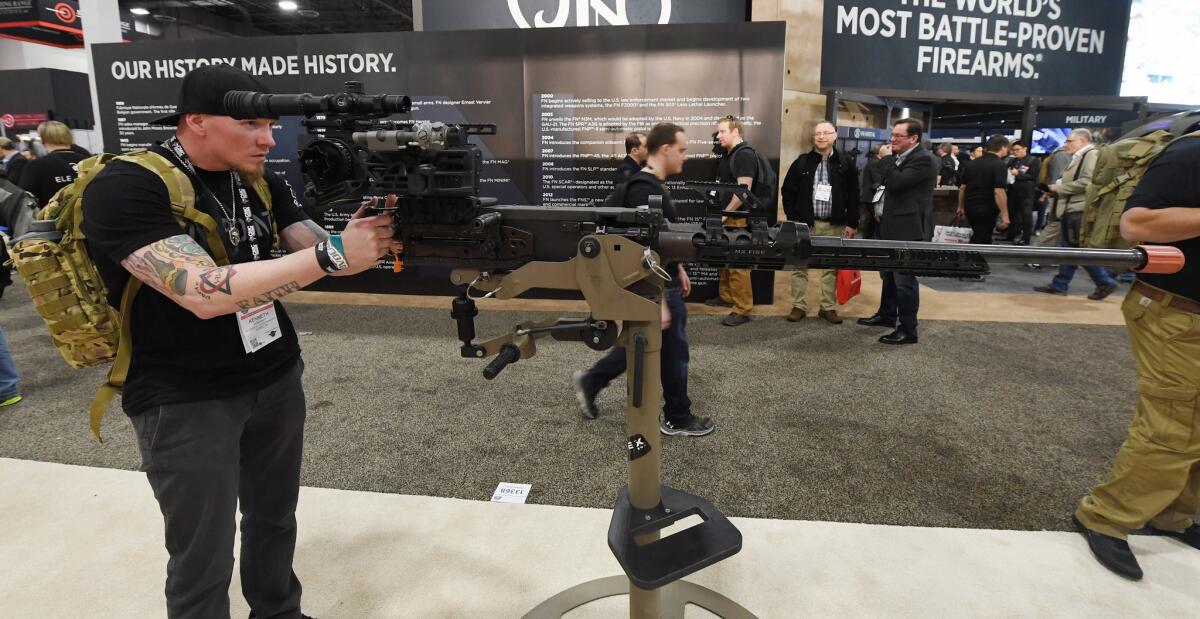California struggles to keep illegal guns and ammunition from crossing state lines

- Share via
SACRAMENTO — Ten special agents from the California Department of Justice were watching as a man walked out of the Big Reno Show and placed his purchases in his car.
The black Isuzu with California plates headed west on Interstate 80 into the Sierra Nevada, eventually crossing the Nevada state line. That’s when the California Highway Patrol pulled Vincent Huey over. Inside the vehicle, state Justice Department agents found 18 high-capacity magazines, some capable of holding 30 rounds, according to court records.
In recent years, California has enacted increasingly strict gun control laws. Assault rifles and ammunition magazines capable of holding more than 10 rounds are illegal to buy or import in California, but stopping their flow over the border has been a struggle. In 2018, according to the federal Bureau of Alcohol, Tobacco, Firearms and Explosives, 3,920 guns originally purchased in Nevada and Arizona were recovered by California law enforcement officers from crime scenes, confiscated from criminals or found unclaimed.
The problem was made clear in July, when a shooting at the Gilroy Garlic Festival killed three people and wounded 17. The 19-year-old gunman used what authorities say was a military-style AK-47 assault weapon purchased legally at a Nevada gun store.
“The importation of those assault-style weapons is against California law,” state Atty. Gen. Xavier Becerra told reporters after the Gilroy attack. “We may have progressive gun laws, but if other states don’t match us, we have to rely on catching these individuals.”
State agents for years have conducted undercover operations and arrested dozens of Californians for bringing illegal guns and ammunition magazines into the state. But some agents have been redeployed to a program that seizes firearms from Californians prohibited from owning them because of felony convictions or mental illness.
“If you have surrounding states that have less restrictive gun laws, you are going to have importation,” said Steve Lindley, the former chief of the Justice Department’s Bureau of Firearms who is now a program manager for the gun control group Brady United. “If there is no enforcement going on, they can just come right across the border.”
In Northern California, Nevada County Dist. Atty. Clifford Newell has prosecuted dozens of people for bringing illegal guns into the state.
“The real crux of the problem is that California has a 608-mile border with Nevada, shared with 12 California counties, and Nevada’s gun regulations are less stringent,” Newell said. “People with sinister and nefarious intent will find a way into California with these weapons and accessories.”
While the state Justice Department has tools to stem the flow of illegal guns — including two new laws that help track out-of-state gun and ammunition purchases — the agency is facing competing priorities, according to spokeswoman Bethany Lesser.
Some agents previously assigned to surveillance operations at gun shows have been shifted in the last few years to efforts to reduce a large backlog in the Armed Prohibited Persons System, a list of California residents who bought guns before they were convicted of felonies or found to be severely mentally ill. The Justice Department reported in March that there were 23,222 people in the database who are prohibited from owning firearms.
Though the state makes little information available about undercover operations in neighboring states, records indicate that weapons purchases are still being watched despite the redeployment of agents.
“DOJ continues to investigate information provided regarding the unlawful importation of illegal firearms into California,” including with undercover investigations, the Justice Department said in a statement.
Lindley said he attended this year’s Reno show as an observer for Brady United. Up to half of the cars in the parking lot, he said, had California plates, adding that undercover law enforcement was also on hand.
“We cannot comment, even to confirm or deny, potential or ongoing investigations or operations,” said a statement from Becerra’s office.
Scott Tarbell, the organizer of the Reno event, said he welcomed the presence of California Justice Department agents and wasn’t concerned about them scaring away potential customers.
“We invite them, but they come at their own leisure and they don’t announce anything,” Tarbell said of the agents. “The only ones they’d scare away are the ones that got no good on their mind.”
On the weekend of this year’s show in August, state Justice Department agents asked the CHP to pull over a 65-year-old man in a pickup on I-80 in Donner Pass who was thought to be bringing “5 high capacity magazines into California,” according to a CHP report.
While further details on the traffic stop were not released, Newell’s office provided detailed investigative reports for cases that have gone through the courts, including the 2014 arrest of Huey.
During that operation, Justice Department special agents dressed as civilians mixed with the crowd inside the gun show. While there, they witnessed the purchases of high-capacity magazines, according to court documents. They later followed Huey, 52, in his Isuzu as he and two companions visited gun shops in Reno to make additional purchases before heading home.
Huey entered a plea bargain for a misdemeanor charge of bringing an ammunition magazine able to hold more than 10 rounds into California. He was sentenced to four days in jail, ordered to pay fines and perform community service, court records show.
John Runfola, the attorney who represented Huey, said he is concerned about such arrests, which involve legal purchases.
“It seems like a setup,” Runfola said. “We need a national policy regarding guns. It is an unfortunate situation that I hope the government can rectify.”
Sen. Nancy Skinner (D-Berkeley), chairwoman of the Senate Public Safety Committee, said she was concerned by reports that undercover operations in Nevada have suffered because of a shift of resources and wants to make sure there is sufficient funding for gun show surveillance.
“The fact that our surrounding states have no reasonable controls on gun sales and gun violence protection really impacts California,” she said.
Gov. Gavin Newsom has also emphasized the need to address the importation of guns from other states.
Earlier this month, he signed 15 bills to toughen restrictions on firearms, including a limit on purchases of semiautomatic rifles to one per month. Newsom also said he has been in discussions on the issue of gun safety with Nevada Gov. Steve Sisolak, a Democrat who recently signed a measure that requires background checks for private-party gun sales.
“We’ve had a lot of conversations,” Newsom said. “He is a very enlightened person. He doesn’t necessarily have the kind of legislative support of the folks you see around me. So his is a more challenging job in many respects.”
In August, a group of two dozen California lawmakers wrote a letter to their counterparts in Nevada asking for a summit to discuss ways that the two states can improve gun safety and stop the importation of illegal firearms into the Golden State.
Though the law requires residents who buy guns and ammunition out of state to have the items delivered to a licensed gun dealer in California and undergo a background check, Becerra said the best solution is for Congress to act on tougher national gun regulations.
“We can’t enforce California laws in Nevada, but if there were a national law that restricted purchase or transportation of assault-style weapons, then the FBI and [Drug Enforcement Administration] and other federal agencies wouldn’t have to wait to start investigating, as in Gilroy, after people have died and been injured,” Becerra said. “It’s unfortunate that our federal leaders have been AWOL in taking action.”
More to Read
Sign up for Essential California
The most important California stories and recommendations in your inbox every morning.
You may occasionally receive promotional content from the Los Angeles Times.











